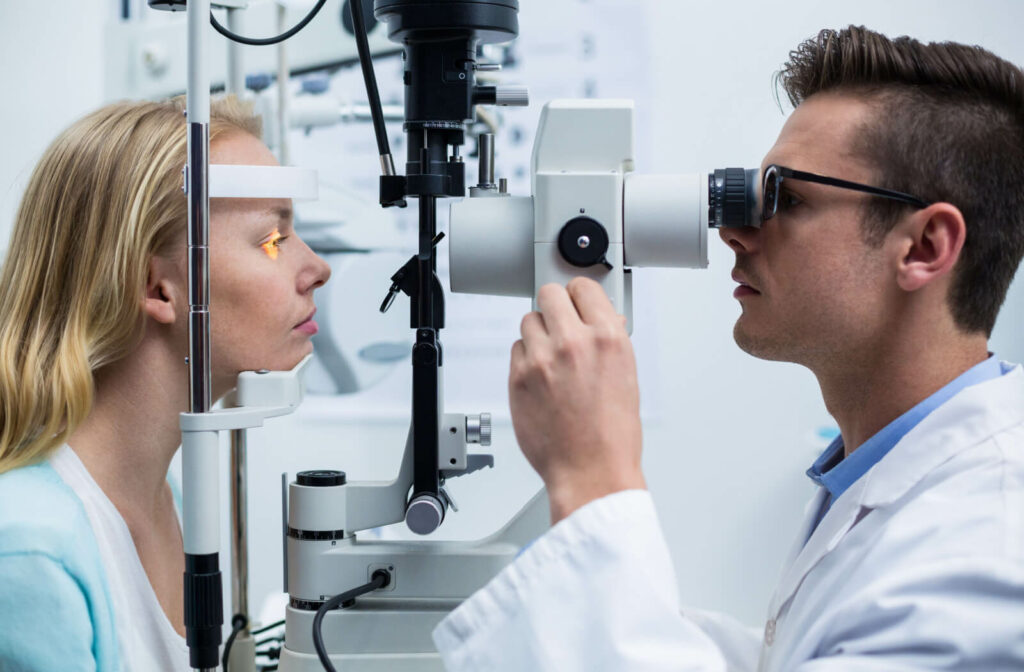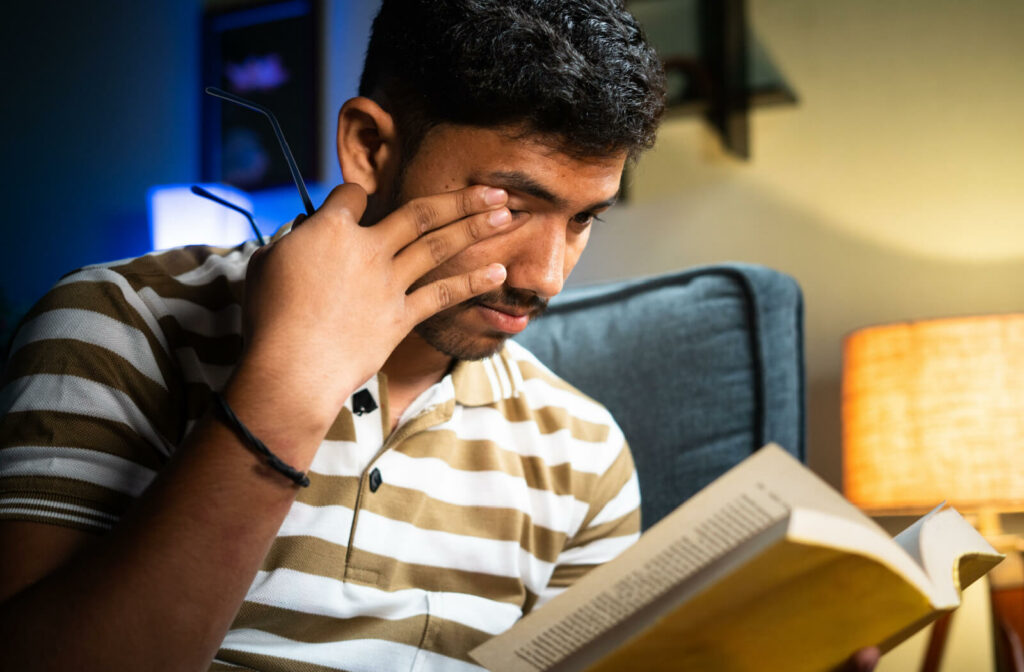When it comes to your vision, it’s important to pay attention to changes or discomfort you may experience. By knowing what signs to watch out for, you can detect potentially-developing conditions early—when they’re often most treatable—and work together with an eye care professional to help your vision remain clear. But how can you tell if you need glasses in the first place?
Typically, the first sign of a vision problem or refractive error is blurry or double vision. However, this isn’t the only sign that you may need glasses! It’s also common to experience:
- Eye strain
- Headaches
- Glare at night
- Dry eye syndrome
- Difficulty reading things up close
It’s also important to note that if you have a family member with myopia (nearsightedness) or hyperopia (farsightedness), you’re significantly more likely to develop these conditions yourself. It’s essential to regularly visit your optometrist for comprehensive eye exams so they can monitor your vision.
Blurry Vision
Blurry vision is one of the first signs that you need glasses. If you notice that objects at a distance appear fuzzy, blurry, or just simply unclear, it’s time to visit the eye doctor. Blurry vision can be caused by myopia, hyperopia, astigmatism, or many other eye conditions.
These conditions cause light entering the eye to refract improperly and hit different points than it should, leading to blurred images. Blurry vision shouldn’t be ignored—even if it’s only temporary, it could be an indicator of a serious eye disease or condition developing.
Double Vision
Experiencing double vision is often an indicator that your eyes aren’t as healthy as they should be. This occurs when your eyes aren’t working together properly, causing overlapping or duplicate images to be processed and sent to your brain.
This can be caused by several factors, such as astigmatism or cataracts developing, or could be linked to a problem such as your eyes themselves being misaligned. In some extreme cases, it could even be a sign of a neurological disorder developing.
It’s important that if you experience double vision, whether temporary or long-term, to visit an optometrist as soon as you can.
Eye Strain
In today’s day and age, with so much access to screens, eye strain has become more and more common. While eye strain is often linked to screen use, that isn’t the sole cause—eye strain can be caused by many different things, like:
- Driving long distances
- Reading too much
- Dry air
- Too much time indoors
- Stress
However, environmental factors aren’t always the cause. In many cases, eye strain can be a sign of an underlying visual problem or refractive error.
Headaches
Frequent headaches can be directly caused by vision problems. If your eyes are straining or working too hard to see clearly and focus, it can lead to a tension headache developing. If you notice that you’re often experiencing headaches after reading, using digital devices, or engaging in a task that’s visually demanding, it may be linked to a vision problem.
An optometrist can examine your eyes, test your visual acuity, and determine if a refractive error or other condition could be contributing to your headaches.
Difficulty Reading
If you’re noticing it’s becoming increasingly difficult to read books, newspapers, or print of any kind, you may need prescription eyeglasses. Difficulty reading can be caused by many different visual conditions, but one of the more common causes is presbyopia—the lens of your eye slowly losing its ability to focus on nearby objects. This condition is commonly associated with age.
Presbyopia can be treated through the use of prescription eyeglasses or contact lenses to help you see comfortably at nearby distances.
Dry Eye Syndrome
One of the more common causes of vision conditions developing is dry eye syndrome, also known as dry eye. Dry eye can be caused by all sorts of things, but each of them has to do with your tear production. Your tears are responsible for keeping your eyes hydrated and moisturized, but if there’s an issue with tear quality or quantity, it can lead to dry eyes.
This condition can also be caused by environmental, medical, and lifestyle factors, like:
- Dust or dirt in the air
- Prolonged screen use
- Medical conditions like diabetic retinopathy
- Contact lenses
- Smoking
Dry eye syndrome is a common condition that affects millions of people every year. It’s important to visit an optometrist so they can diagnose the root cause of your dry eye syndrome and help you make a plan to treat this condition.
Night Glare
If you’re experiencing a glare at night or a halo around light sources when it’s darker out, you may be developing a vision problem. Conditions like astigmatism, cataracts, or problems developing with your cornea can cause light rays to scatter as they enter your eye, leading to sources of light appearing blurry or circular.
This can cause difficulty seeing at night and can impair your ability to navigate safely after dark, making driving and walking unsafe due to the glare.

How to Tell When to Visit an Optometrist
Your vision makes a significant impact on your quality of life, so it’s important that you note changes to it. If you develop any problems with your vision, you should visit an optometrist as soon as you can so they can diagnose the root cause of your problem. They can help you make a plan to treat your vision problems accordingly.
It’s recommended that adults visit the optometrist at least once a year for regular comprehensive eye exams. To speak with a caring and educated professional today, schedule an appointment with us here at River Heights Eye Care!


